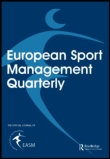
18 Sep ESMQ: Call for Papers 2016 Special Issue (16.1)
Sport management is essentially a knowledge-driven business, which relies heavily on the ability of managers to effectively acquire and interpret information, and to create and manage new knowledge. Despite the fundamental importance of knowledge to management, the academic sport management community has failed to systematically address how sport managers deal with creativity, innovations, information and knowledge management. Most work in this area has been very sporadic (i.e. not the result of a coherent programme of research) and approached knowledge creation and management from a variety of perspectives including: sociology (e.g. knowledge as power), policy (e.g. evidence-based policy making), business (e.g. using knowledge for competitive advantage) and philosophy (e.g. ontology of knowledge).
In the context of the present special issue knowledge is interpreted both as a means (i.e. routine-procedural knowledge that is concrete and manual) and as a goal (i.e. declarative-generative knowledge that is abstract and intellectual). It is generally believed that the apex of generative-declarative knowledge is creative knowledge in the sense of knowledge creation (Kaufman and Runco, 2009). However, knowledge is not an enduring object with constant properties, but rather something that is constantly recreated in a particular context. Therefore, it has to do with understanding – ‘to understand is to create’ (Piaget, 1976). The main generative mechanism for new knowledge creation in sport management comes from the exercise of judgement – the ability of researchers and managers to draw new distinctions concerning an issue at hand within the context of a dialogical relationship with particular group, community or society (Tsoukas, 2009).
Aims of Special Issue
The main goal of this special issue is to expand our understanding of the role of creativity, innovation, information and knowledge management in a variety of sport management contexts, such as sport governance, sport participation, sport events, information technology management and the learning capacity of sports organizations. This will be achieved by bringing together a collection of original, theoretically and empirically informed knowledge perspectives from various sport organisations and fields of operations. The special issue will also seek to examine critical ontological questions concerning how does the possibility emerge for the academic community to take an interest in specific sport management matters? How do research objects enter and exit the sport management gaze? Which topics and issues have emerged as result of the research activities of sport management scholars? Which sport management phenomena have themselves changed over the course of being studied?
The special issue will also serve as a useful teaching aid and reference source.
Examples of themes/sub-themes and potential authors:
The special issue will encourage submissions related to the processes of managing creativity, innovation, information and knowledge in a variety of contexts. Indicative topics include, but are not limited to:
1. How do managers and staff in sport and event organizations create, use and transfer knowledge?
2. Use and misuse of technology (social media, Internet) for information distribution and knowledge creation;
3. Managing information and knowledge systems in sport;
4. Theoretical perspectives in knowledge creation and management taking into account the specificity of the sports management field;
5. Research approaches and techniques in information and knowledge management;
6. Evidence-based policy: the role of knowledge and its management;
7. Epistemic communities in sport management;
8. Teaching innovation and knowledge management in sport;
9. The role of organisational structure and culture of sport governing bodies in the creation of knowledge;
10. The role of knowledge management consultants in sport and event business.
How to Submit
Submission of manuscripts is open to everyone interested in the topic. Papers should be submitted in electronic format through Manuscript Central; indicating you want the manuscript to be considered for Special Issue 16.1 [manuscripts in review process].
Guest Editors
Vassil Girginov, Brunel University vassil.girginov@brunel.ac.uk
Annick Willem, Ghent University annick.willem@ugent.be
Kristine Toohey, Griffith University k.toohey@griffith.edu.au


